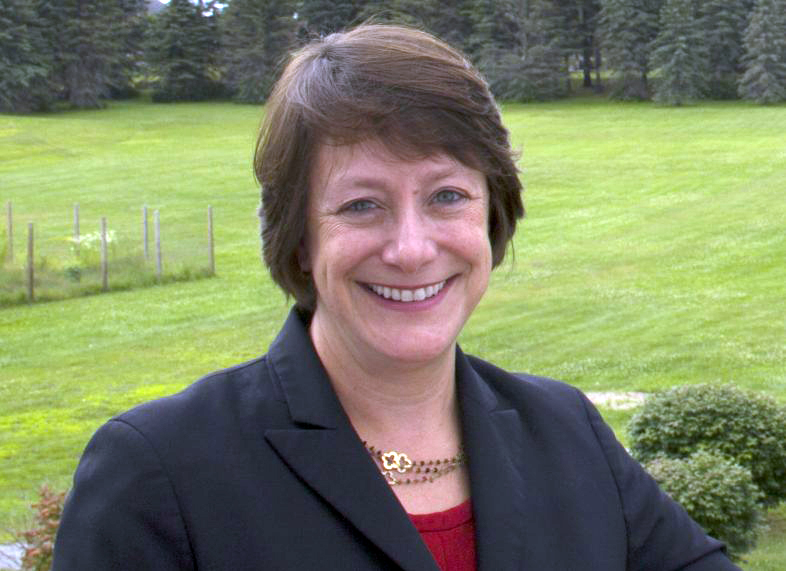A veteran leader takes helm at UMA
Rebecca Wyke became president of the University of Maine at Augusta just seven months ago, but she displays the assurance of a State House veteran — undoubtedly because she is one. Starting at the Secretary of State’s Office in 1986, she’s been in state service for three decades; one stint at an accounting firm convinced her the public sector was where she was meant to be.
A native of Rockport, Wyke is a rarity: a campus president who’s also mastered the legislative and executive branches. In an interview this week at her office, tucked away behind the Farmhouse on the Augusta campus, she describes herself as “a problem solver” who likes a challenge.
She’s had plenty. When she became director of corporations at the Secretary of State’s Office, she inherited a defunded division that had a six-month backlog in filings, and $600,000 in uncashed checks. Soon, there was a two-day turnaround.
At the Ethics and Elections Commission, she worked to rebuild confidence after a 1993 ballot-tampering scandal sharply eroded it, prompting the end of House Speaker John Martin’s long tenure and installation, by voters, of legislative term limits. While much of state government resisted reform, new election procedures and security measures helped restore the sense that Maine elections are clean and fair.
In 2002, her husband, Joe Mayo — a longtime legislator and later House clerk — was dying from ALS. He urged her to join what was soon to become the Baldacci administration.
He advised her to ask for a specific job — “otherwise you probably won’t get it” — and she focused on commissioner of finance and administration, the state’s budget chief.
Wyke got her wish, though, she said, “It was a little strange to be congratulated on getting the job before I’d even had the interview.”
For more than five years, she “plugged holes in the dike,” initially facing a $1.4 billion structural deficit and a revenue situation that, for various reasons, never really improved. In 2008, she became vice chancellor of the University of Maine System, beginning a years-long effort, spanning two administrations, to centralize administrative functions from seven campuses and reconfigure programs.
More recently, she served as interim president at UMA, then — after the new president lasted only 18 months — returned, settling down for the long term. Those who know her well say campus president is, perhaps, her ideal posting.
She’s taken stock of UMA’s assets and liabilities, and re-emphasized UMA’s unique role as the hub for the system’s offerings to “non-traditional” students, those 25 and older who may already hold jobs, be parents and own a home. Enrollment is about 5,800, making it the third largest campus, after Orono and Portland-Gorham, in terms of students.
Only 1,000 are on the Augusta campus, with another 1,800 at University College in Bangor, which UMA has administered since 1992; the rest are at eight regional centers or online. Wyke credits former UMA President George Connick with pioneering “distance learning,” but said experience shows that many students do best with face-to-face classes initially, gradually moving off campus as they balance work and study.
The need for this kind of higher education has never been greater, she said. Maine’s much discussed “demographic winter,” with deaths outpacing births, and a median age exceeding 44, can only be stemmed through immigration and higher educational attainment; while not every good job requires a college degree, almost all require some post-secondary training.
Wyke says that UMA, while well-positioned to attract such students, can’t neglect successful bachelor’s degree programs, including a five-year architectural degree program, now located downtown on Water Street, and a four-year aviation program, as well as strong nursing and jazz music offerings. It’s these students who’d be attracted by campus housing, something the Augusta community has long desired.
UMA recently unveiled 20-year plans for both the Augusta and Bangor campuses, and in Augusta, residence halls and an aviation building would occupy the center of the campus.
“We’re dramatically short of space here,” Wyke said. “We need room to grow.”
Any expansion, however, will require more state support for the system, which has lagged badly since 2008, falling $58 million behind what would have been required simply to match inflation.
With another new administration on the horizon, Wyke seems cautiously optimistic about UMA’s future, which has the lowest student costs of any campus. “Where else can you find a bachelor’s degree program, tuition and fees, for $8,000 a year?” she said.
For Maine’s economy to grow again, higher education has to be part of the prescription, Wyke said. “We must increase our personal income. And the proven way to do that is to better educate our citizens.”
Douglas Rooks has been a Maine editor, opinion writer and author for 33 years. He lives in West Gardiner, and welcomes comment at: drooks@tds.net
Copy the Story LinkSend questions/comments to the editors.



Success. Please wait for the page to reload. If the page does not reload within 5 seconds, please refresh the page.
Enter your email and password to access comments.
Hi, to comment on stories you must . This profile is in addition to your subscription and website login.
Already have a commenting profile? .
Invalid username/password.
Please check your email to confirm and complete your registration.
Only subscribers are eligible to post comments. Please subscribe or login first for digital access. Here’s why.
Use the form below to reset your password. When you've submitted your account email, we will send an email with a reset code.